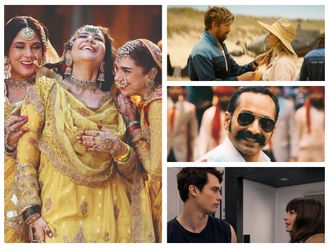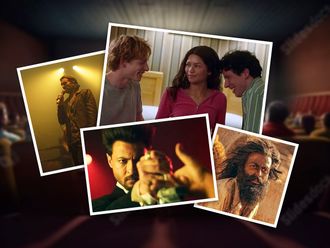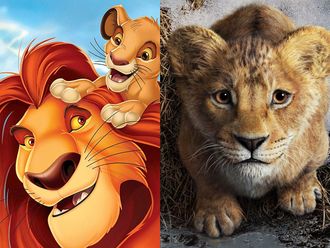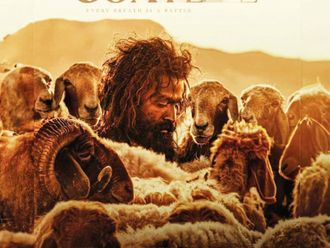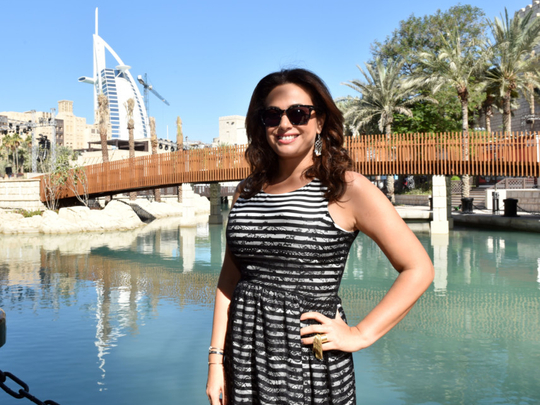
Tunisian actress Hend Sabry reveals the fun side of her personality, perhaps unwittingly, when she turns up for this interview wearing a striped dress and sporty red Valentino sneakers, as opposed to a pair of heels.
It’s a contrast to her red carpet look on the opening night of the 12th edition of Dubai International Film Festival 24 hours before where she turned up in a couture black gown and diamond-studded earrings.
“It was nice to be glammed up for the night. But that was not the usual me. The ‘usual me’ is in sneakers and jeans,” said Sabry.
“I am a [mother] of two. I have to fight sleep deprivation and kilos piling on during pregnancy,” she added. The actress, 36, who has acted in a string of powerful women-centric films such as Asmaa (she played a HIV-infected woman who faces prejudice in Arab society), is on call this year to judge the IWC Filmmaker Award, which helps aspiring filmmakers from the region transform their script into a film.
“There are many women participating this year and I am proud about that,” said Sabry, a staunch gender-equality advocate. In 2010, she was also appointed the celebrity ambassador for the United Nation’s World Food programme.
“I am a firm believer in women. I respect them and believe in them. We are multitaskers, humane and emotional. We carry emotions much easily. We have a stronger core.”
She is a prime example of her beliefs as she opens up about her career, Islam and the importance of art bridging boundaries …
How was the experience of being in the IWC judging panel?
It was a beautiful experience because on this jury we read scripts instead of watching films. Reading scripts is a lonelier experience. The beauty of a script is that you and I will read them, but we will not imagine the same film since it is all based on our point of view and cinematic DNA. The filmmakers are young and there are many women participating this year. I am proud about that.
What’s the way forward for Arab women filmmakers?
Now, the Arab women filmmakers are much more outspoken. They want to work, assert themselves and do something positive in Arab society. They are less apologetic. They are proud about being multifaceted and speak about what they want or don’t want. As an Arab woman, who has been working in this region for 20 years, I have seen the progress of this new generation of women. I am proud of them and many are making beautiful movies. They touch me by their will, their strength and their smartness.
As an actress, were you at the receiving end of discrimination when you started your career at 14?
I was lucky that I came from a country where women have equal rights to men and where women’s rights are advanced when compared to other countries in the region. I have always been an ambassador for Tunisian women who are strong and who are active in civil society. Even in the films I chose, I always selected roles which showed the modern Arab women or conflicts of a woman who wanted to be something more than just a weak part in society. I was never interested in playing the quiet, weak woman on the big screen. I want to play the strong, opinionated women. This didn’t always bring me friends in this region and I have been labelled as someone who was too daring. But today, when someone stops me in the street and tells me that through my films and life they have been given the clear message that ‘we [women] are not just about looks. We are also about doing what we want to do and even having pictures without make-up.’ Beauty comes from inside and when women on the street tell me that I have helped them somehow through my strong roles, it makes me feel good.
But are strong roles easy to come by and are you considered bankable at the box office?
Like any film industry around the world, the male lead will take home five times [the money] than a leading lady. Even Hollywood has the same problem. Some actresses have been complaining about it. But here, we are fighting everyday and we can see that Arab lead actresses are more bankable than 20 years ago. We can now make films that have women leading them. Two decades ago, it wasn’t even imaginable that you can have a movie without a male lead. There’s progress, but there’s lots to be done.
What are your thoughts on the increased intolerance of Muslims in the West and the recent bigoted statements made by US presidential candidate Donald Trump?
I don’t want to feel threatened by such racist messages and by such world reactions. This does not affect me or my religion. The religion that’s being stigmatised is not my religion. It’s terrorism, and a political thing. I don’t want to get into a fight that’s not mine. I don’t think we should feel threatened by forces of evil fighting together. I still want to see my religion as a religion of love and peace. I want to live in respect of other religions and my religion. This is how I want to see it. Nowadays, it’s all about who’s loud and who’s louder. These battles are not ours. Terrorism is not Islam. Terrorism can come from people who pretend they are Muslim or any other thing in the world. This is not my religion.
How do film festivals bridge boundaries?
We are building fortresses with cultural elements. They are stronger and more efficient than wars because there are no weapons involved. Secondly, it’s about people coming together to see a movie, watch a song or watching a beautiful painting. I can be Tunisian, Indian, Swedish, Canadian, but we experience something together. For instance, yesterday at the opening film Room, all the guests felt the same exact emotions. Art is the most efficient way to remind humans that all those wars and conflicts mean nothing. All the film festival around the world, including the Dubai International Film Festival, have the same mission: to build fortresses against darkness and ignorance. When I first came to Diff in 2005, it was about the East meeting the West. We are celebrating life, beauty, art and human emotions that we all share.
Have you ever experienced a star-struck moment in Diff?
Meeting Robert De Niro. I had dinner with him and I was speechless. Honestly, when I am at festivals and you meet your favourite celebrities, they are not what you expect them to be. You get disappointed, but despite that I will still continue to like them on the big screen. Maybe you might wish they were more curious about other cultures, tradition and respectful of others tradition.



